外研版英语七年级下Revision Module B课件(19张PPT)
文档属性
| 名称 | 外研版英语七年级下Revision Module B课件(19张PPT) | 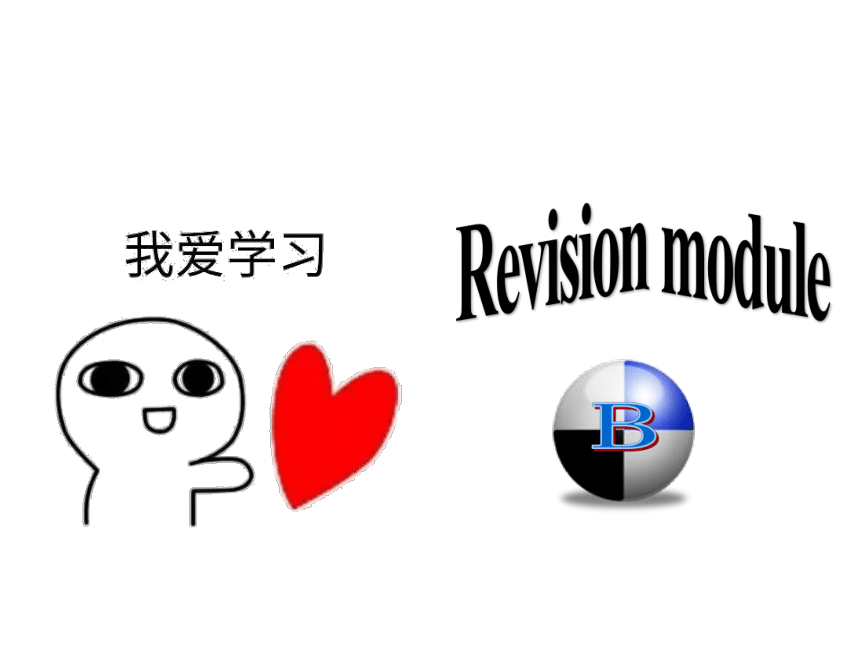 | |
| 格式 | pptx | ||
| 文件大小 | 777.6KB | ||
| 资源类型 | 教案 | ||
| 版本资源 | 外研版 | ||
| 科目 | 英语 | ||
| 更新时间 | 2022-06-14 10:59:55 | ||
图片预览


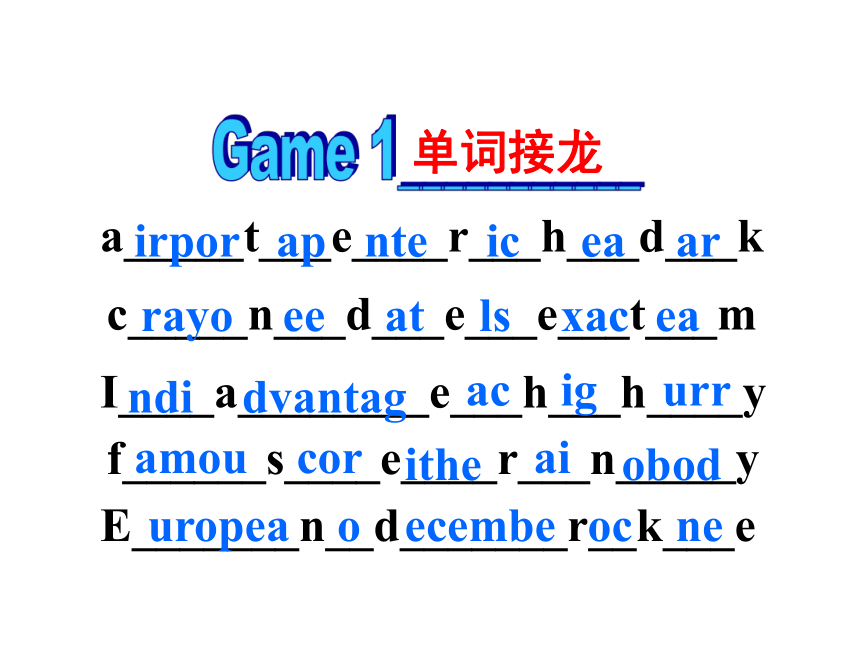
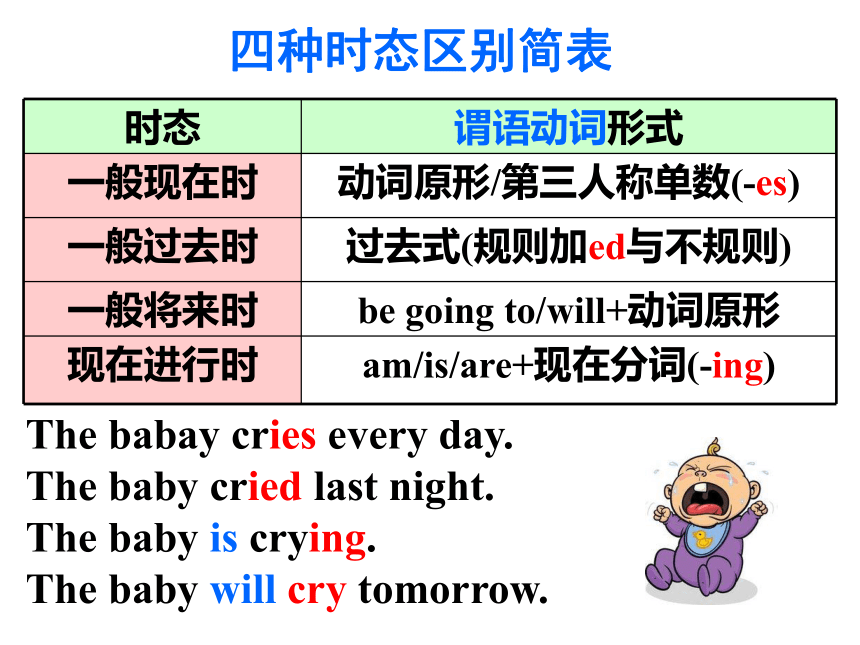
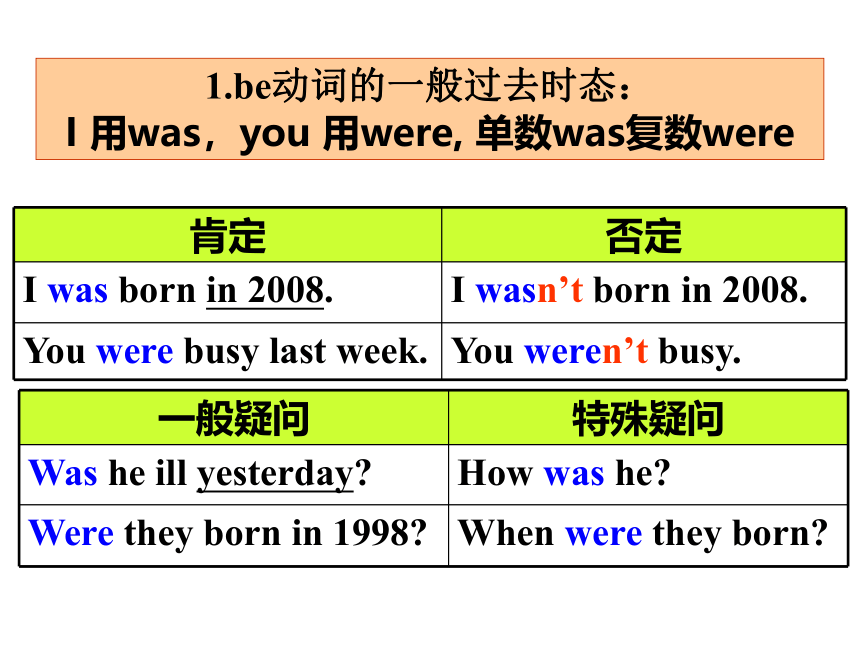

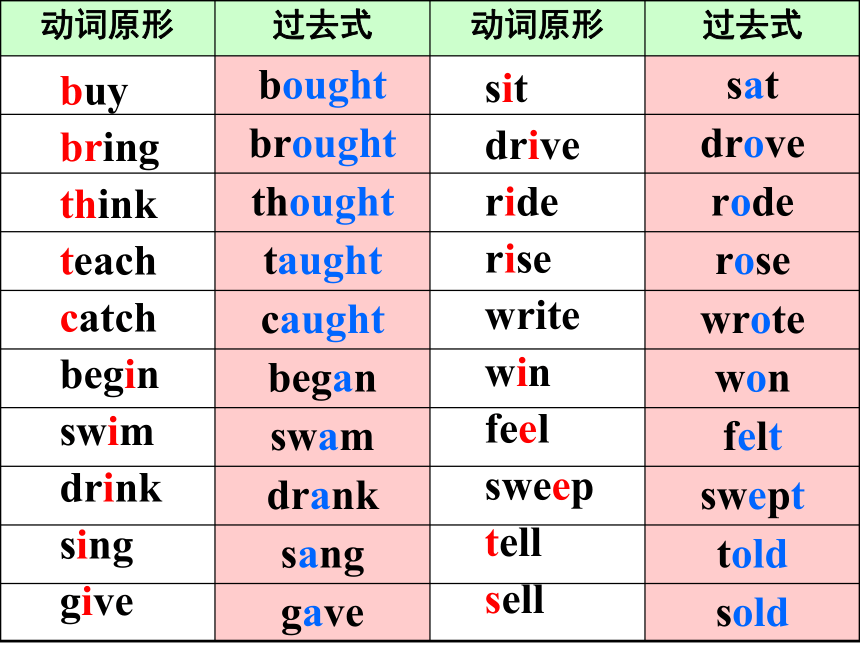
文档简介
(共19张PPT)
Revision module
B
词汇
时态
句类
阅读
c_____n___d___e___e___t___m
a_____t___e____r___h___d___k
irpor
ap
nte
ic
ea
ar
I____a________e___h___h____y
f______s____e____r___n_____y
E_______n__d_______r__k___e
rayo
ee
at
ls
xac
ea
ndi
dvantag
ac
ig
urr
amou
cor
ithe
ai
obod
uropea
o
ecembe
oc
ne
Game 1___________
单词接龙
时态 谓语动词形式
一般现在时 动词原形/第三人称单数(-es)
一般过去时 过去式(规则加ed与不规则)
一般将来时 be going to/will+动词原形
现在进行时 am/is/are+现在分词(-ing)
The babay cries every day.
The baby cried last night.
The baby is crying.
The baby will cry tomorrow.
四种时态区别简表
肯定 否定
I was born in 2008. I wasn’t born in 2008.
You were busy last week. You weren’t busy.
一般疑问 特殊疑问
Was he ill yesterday How was he
Were they born in 1998 When were they born
1.be动词的一般过去时态:
I 用was,you 用were, 单数was复数were
肯定 否定
He smiled. He didn’t smile.
一般疑问 特殊疑问
Did he smile yesterday When did he smile
2.行为动词的一般过去时态:动词变过去式
___ you watch TV last night
A. Were B. Did C. Are
动词原形 过去式 动词原形 过去式
bought sat
brought drove
thought rode
taught rose
caught wrote
began won
swam felt
drank swept
sang told
gave sold
buy
bring
think
teach
catch
begin
swim
drink
sing
give
sit
drive
ride
rise
write
win
feel
sweep
tell
sell
动词原形 过去式 动词原形 过去式
paid came
said became
knew put
drew read
flew let
broke meant
spoke learnt
built heard
spent took
sent stood
pay
say
know
draw
fly
break
speak
build
spend
send
come
become
put
read
let
mean
learn
hear
take
stand
Hans Christian Andersen was a famous writer of
stories for children. He (1)_________ into a poor family in Denmark in 1805. His father (2) ______ when the boy was eleven. Hans (3) ______ a few jobs. Finally, at the age of fourteen, he (4) __________ to the capital of Denmark to work in the theatre. Then he (5)_______ on to study and later he (6)____________around Europe.
be born become come die find go
like move read travel try write
was born
died
tried
moved
went
travelled
4. Complete the passage.
His first book (7) ______out in 1822. He (8)_______
many stories for children, but older people also (9)
________ them interesting. Many of his stories (10)
_________very famous, like The Ugly Duckling and
The Little Match Girl. People still (11)_________ to
read them today and they can (12) ______ them in
many languages.
came
wrote
found
became
like
read
be born become come die find go
like move read travel try write
Seventy years ago, when my grandpa was
young, life was very different. Grandpa(1)
__________(listen) to music but he (2)
___________(not watch) TV. He (3)
___________(play) the piano but he (4)
____________(not play) computer games.
He (5) _________(have) a telephone, but of
course he (6) __________(not send ) emails.
His family (7) ___________(not have) a car.
listened
didn’t watch
played
had
didn’t play
didn’t send
didn’t have
5. Complete the passage with the correct form.
He (8) _________( ride) his bike to school and he (9) _________(travel) by train when he went on holiday. He often (10)________
( go)to the sea and (11) _________(swim) in the sea.He (12) ________(have) a camera, but it (13)________(not be ) a modern camera and he (14)____________( not take) colour photos.
rode
travelled
went
swam
had
wasn’t
didn’t take
Henry,
Hi! I’m on holiday in London with my friend
Jenny.We(1)________by plane on Monday
and (2) ________a taxi to our hotel in central
London. I (3)_________for a walk in Hyde
Park but Jenny was tired so she didn’t (4)
___________. Yesterday morning we first (5)
__________ Big Ben and Buckingham Palace.
Queen Elizabeth lives in the Palace, but we
didn’t see her!
arrived
took
went
come
plete the email.
arrive buy come do go
have look take visit
visited
Then we (6) ________the British Museum and (7) __________ dinner in a Chinese restaurant. Today we went to Tower Bridge on the River Thames and (8)________at the city. It’s very big! This afternoon we(9) _________ some shopping. Jenny didn’t buy anything,but I (10 ) ___________ a present for you and I posted it just now. I hope you’ll like it! Say hello to your mum and dad.
Emma
visited
had
looked
did
bought
arrive buy come do go
have look take visit
No talking.
No running.
No photos.
No swimming.
Now explain these signs with don’t.
Don’t talk.
Don’t run.
Don’t take
photos.
Don’t swim.
6. Match the pictures with their meaning.
What a poor pig (it is)!
How poor (the pig is)!
How carelessly (you write)!
How careful (she is)!
1.___ lively boys.
2.____ lively the boys are!
3.____ hot tea it is!
1. It is a nice present.
_______ nice present it is!
2. It’s a fine day today.
_______________ it is today!
3. They live a happy life today!
_____________ life they live today!
4. It was wonderful music.
__________________ it was!
What a
What a fine day
What a happy
What wonderful music
7. Rewrite the sentences with what.
African Americans added a lot to the history of music between 1900 and 2000. Blues, rock and rap are all important musical developments.
The blues is sad, slow music from America. Blues musicians are often African Americans. Blues songs often tell sad stories because Africans in America had difficult lives.
Rock music comes from America too. It started in the 1950s. The slow, sad blues and American country music come together to make rock. It’s good for dancing. Blues musicians usually play alone, but rock musicians usually play together.
Rap music comes from African American music. It first started in the 1970s when young African Americans played on the streets of New York City. Many people now think that the words of rap music are really poems. Rap is very important in pop music.
1.How many kinds of music
2.What about their features
3.What’s the best title
4.What’s the structure
3.American music or Rap
4.
1
2
3
4
Thank you!
Revision module
B
词汇
时态
句类
阅读
c_____n___d___e___e___t___m
a_____t___e____r___h___d___k
irpor
ap
nte
ic
ea
ar
I____a________e___h___h____y
f______s____e____r___n_____y
E_______n__d_______r__k___e
rayo
ee
at
ls
xac
ea
ndi
dvantag
ac
ig
urr
amou
cor
ithe
ai
obod
uropea
o
ecembe
oc
ne
Game 1___________
单词接龙
时态 谓语动词形式
一般现在时 动词原形/第三人称单数(-es)
一般过去时 过去式(规则加ed与不规则)
一般将来时 be going to/will+动词原形
现在进行时 am/is/are+现在分词(-ing)
The babay cries every day.
The baby cried last night.
The baby is crying.
The baby will cry tomorrow.
四种时态区别简表
肯定 否定
I was born in 2008. I wasn’t born in 2008.
You were busy last week. You weren’t busy.
一般疑问 特殊疑问
Was he ill yesterday How was he
Were they born in 1998 When were they born
1.be动词的一般过去时态:
I 用was,you 用were, 单数was复数were
肯定 否定
He smiled. He didn’t smile.
一般疑问 特殊疑问
Did he smile yesterday When did he smile
2.行为动词的一般过去时态:动词变过去式
___ you watch TV last night
A. Were B. Did C. Are
动词原形 过去式 动词原形 过去式
bought sat
brought drove
thought rode
taught rose
caught wrote
began won
swam felt
drank swept
sang told
gave sold
buy
bring
think
teach
catch
begin
swim
drink
sing
give
sit
drive
ride
rise
write
win
feel
sweep
tell
sell
动词原形 过去式 动词原形 过去式
paid came
said became
knew put
drew read
flew let
broke meant
spoke learnt
built heard
spent took
sent stood
pay
say
know
draw
fly
break
speak
build
spend
send
come
become
put
read
let
mean
learn
hear
take
stand
Hans Christian Andersen was a famous writer of
stories for children. He (1)_________ into a poor family in Denmark in 1805. His father (2) ______ when the boy was eleven. Hans (3) ______ a few jobs. Finally, at the age of fourteen, he (4) __________ to the capital of Denmark to work in the theatre. Then he (5)_______ on to study and later he (6)____________around Europe.
be born become come die find go
like move read travel try write
was born
died
tried
moved
went
travelled
4. Complete the passage.
His first book (7) ______out in 1822. He (8)_______
many stories for children, but older people also (9)
________ them interesting. Many of his stories (10)
_________very famous, like The Ugly Duckling and
The Little Match Girl. People still (11)_________ to
read them today and they can (12) ______ them in
many languages.
came
wrote
found
became
like
read
be born become come die find go
like move read travel try write
Seventy years ago, when my grandpa was
young, life was very different. Grandpa(1)
__________(listen) to music but he (2)
___________(not watch) TV. He (3)
___________(play) the piano but he (4)
____________(not play) computer games.
He (5) _________(have) a telephone, but of
course he (6) __________(not send ) emails.
His family (7) ___________(not have) a car.
listened
didn’t watch
played
had
didn’t play
didn’t send
didn’t have
5. Complete the passage with the correct form.
He (8) _________( ride) his bike to school and he (9) _________(travel) by train when he went on holiday. He often (10)________
( go)to the sea and (11) _________(swim) in the sea.He (12) ________(have) a camera, but it (13)________(not be ) a modern camera and he (14)____________( not take) colour photos.
rode
travelled
went
swam
had
wasn’t
didn’t take
Henry,
Hi! I’m on holiday in London with my friend
Jenny.We(1)________by plane on Monday
and (2) ________a taxi to our hotel in central
London. I (3)_________for a walk in Hyde
Park but Jenny was tired so she didn’t (4)
___________. Yesterday morning we first (5)
__________ Big Ben and Buckingham Palace.
Queen Elizabeth lives in the Palace, but we
didn’t see her!
arrived
took
went
come
plete the email.
arrive buy come do go
have look take visit
visited
Then we (6) ________the British Museum and (7) __________ dinner in a Chinese restaurant. Today we went to Tower Bridge on the River Thames and (8)________at the city. It’s very big! This afternoon we(9) _________ some shopping. Jenny didn’t buy anything,but I (10 ) ___________ a present for you and I posted it just now. I hope you’ll like it! Say hello to your mum and dad.
Emma
visited
had
looked
did
bought
arrive buy come do go
have look take visit
No talking.
No running.
No photos.
No swimming.
Now explain these signs with don’t.
Don’t talk.
Don’t run.
Don’t take
photos.
Don’t swim.
6. Match the pictures with their meaning.
What a poor pig (it is)!
How poor (the pig is)!
How carelessly (you write)!
How careful (she is)!
1.___ lively boys.
2.____ lively the boys are!
3.____ hot tea it is!
1. It is a nice present.
_______ nice present it is!
2. It’s a fine day today.
_______________ it is today!
3. They live a happy life today!
_____________ life they live today!
4. It was wonderful music.
__________________ it was!
What a
What a fine day
What a happy
What wonderful music
7. Rewrite the sentences with what.
African Americans added a lot to the history of music between 1900 and 2000. Blues, rock and rap are all important musical developments.
The blues is sad, slow music from America. Blues musicians are often African Americans. Blues songs often tell sad stories because Africans in America had difficult lives.
Rock music comes from America too. It started in the 1950s. The slow, sad blues and American country music come together to make rock. It’s good for dancing. Blues musicians usually play alone, but rock musicians usually play together.
Rap music comes from African American music. It first started in the 1970s when young African Americans played on the streets of New York City. Many people now think that the words of rap music are really poems. Rap is very important in pop music.
1.How many kinds of music
2.What about their features
3.What’s the best title
4.What’s the structure
3.American music or Rap
4.
1
2
3
4
Thank you!
同课章节目录
- Module 1 Lost and found
- Unit 1 Whose bag is this?
- Unit 2 Are they yours?
- Unit 3 Language in use
- Module 2 What can you do ?
- Unit 1 I can play the piano
- Unit 2 I can run really fast
- Unit 3 Language in use
- Module 3 Making plans
- Unit 1 What are you going to do at the weekends?
- Unit 2 We're going to cheer the players.
- Unit 3 Language in use
- Module 4 Life in the future
- Unit 1 Everyone will study at home
- Unit 2 Every family will have a small plane.
- Unit 3 Language in use
- Module 5 Shopping
- Unit 1 What can I do for you?
- Unit 2 You can buy everything on the Internet
- Unit 3 Language in use
- Module 6 Around town
- Unit 1 Could you tell me how to get to the Nationa
- Unit 2 The London Eye is on your right.
- Unit 3 Language in use
- Revision module A
- Module 7 My past life
- Unit 1 I was born in a small village.
- Unit 2 I was born in Quincy.
- Unit 3 Language in use
- Module 8 Story time
- Unit 1 Once upon a time….
- Unit 2 Goldilocks hurried out of the house.
- Unit 3 Language in use
- Module 9 Life history
- Unit 1 He left school and began work at the age of
- Unit 2 He decided to be an actor.
- Unit 3 Language in use
- Module 10 A holiday journey
- Unit 1 What did you do?
- Unit 2 This morning we took a walk.
- Unit 3 Language in use
- Module 11 Body language
- Unit 1 They touch noses!
- Unit 2 Here are some ways to welcome them.
- Unit 3 Language in use
- Module 12 Western music
- Unit 1 It's so beautiful!
- Unit 2 Vienna is the centre of European classical
- Unit 3 Language in use
- Revision module B
